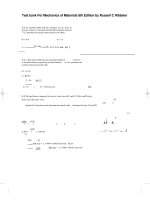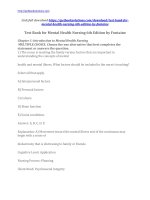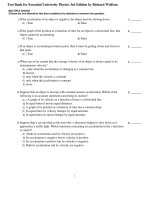download test bank for global health 101 2nd edition by richard skolnik
Bạn đang xem bản rút gọn của tài liệu. Xem và tải ngay bản đầy đủ của tài liệu tại đây (90.29 KB, 5 trang )
Test Bank for Global Health 101 2nd edition by Richard Skolnik
Chapter 5 Testbank
Global Health 101, 2nd Edition
Richard Skolnik
1. According to the WHO, what is a health system?
a. A system between hospitals and clinics where patients are treated
b. All actors, institutions, and resources that undertake health actions
c. A system to connect different levels of healthcare services
2. The primary functions of a health system include the following, EXCEPT:
a. Carry out basic science research
b. Provide health services
c. Raise money that can be spent on health, referred to as “resource generation”
3. Health services generally expected to be included at the primary level in lowincome
countries are:
a. Child health care, maternal health care, treatment of HIV
b. Emergency obstetric care, maternal health care, child health care
c. Maternal health care, family planning, diagnosis and treatment of TB
4. The health system of which country comes closest to being a national health
service in
which the government organizes, manages, and provides health services?
a. Brazil
b. United States
c. Costa Rica
5. In which of the following countries would you expect out-of-pocket
expenditure to be
the highest share of total health expenditure:
a. Costa Rica
b. Cuba
c. Nepal
6. Which of the following is the only high-income country to have more than 50%
of
total expenditure in the private sector?
a. United Kingdom
b. United States
c. Switzerland
7. The following are significant challenges with health systems in low- and
middleincome
countries, EXCEPT:
a. How to provide health care at an appropriate level of quality
b. How to deal with an abundance of skilled health care workers
c. The creation of mechanisms to provide the poor with protection from the
costs of health services
8. A key challenge for human resources for health in low-income countries
includes:
a. A concentration of staff in the capital city and large urban areas
b. How to deal with high staff salaries
c. How to train more physicians to be physician/scientists
9. Which of the following is an important epidemiological and demographic
issue that
faces health systems?
a. The aging of populations and higher burden of communicable diseases
b. The increase in youth populations and higher burden of communicable diseases
c. The aging of populations and higher burden of non-communicable diseases
10. The following are steps that can be taken to improve the effectiveness
and efficiencyof weaker health systems in low- and middle-income countries,
EXCEPT:
a. Improve the procurement of drugs and supplies
b. Concentrate more on the provision of specialized surgery
c. Strengthen emergency obstetric care
11. The components of a health system would include the following,
EXCEPT: a. Health providers
b. Public health laboratories
c. The general tax system
12. According to WHO, the building blocks of a health system include
the following,
a. Human resources for health
b. Higher education
c. Health technology, equipment, supplies, and materials
13. Which of the following health services are generally expected to be included at
the
primary level in low-income countries?
a. Child health, maternal health, and basic surgery
b. Maternal health, child health, and TB control
c. Advanced emergency care, TB control and the control of malaria
14. In which country would you expect out-of-pocket expenditure to be a
higher share of
total health expenditure?
a. France
b. Costa Rica
c. Pakistan
15. The health system of which country comes closest to being a national health
service
in which the government organizes, manages, and provides health services?
a. Argentina
b. Cuba
c. Germany









